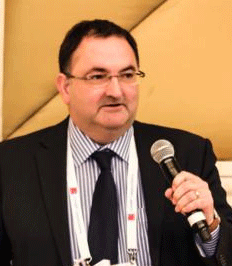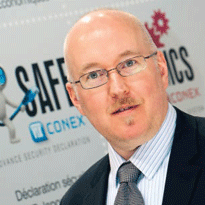| 
This
is the last in the series titled “Best In Show.” There were
three important and informative gatherings that capped off the air cargo
trade show event year for 2014.
First
came The Air Cargo Handlers Conference (ACH) held in Milan. Next was The
International Air Cargo Association (TIACA) Air Cargo Forum (ACF) held
in Seoul, Korea. Finally, there was the FIATA annual world event that
was held in Istanbul, Turkey.
To us, the content of these industry encounters
can serve as a primer for things to come this year. If you missed any
part of this series just scroll to the bottom of this article and select
a highlighted issue and click to read.
 At
FIATA in Istanbul, speaker Mr. Gordon Wright, Customs & Cargo Trade
Facilitation Senior Manager, IATA gave an interesting presentation introduction
on the topic: ‘The air cargo supply chains call on a joint approach
to aviation security advance information.’ At
FIATA in Istanbul, speaker Mr. Gordon Wright, Customs & Cargo Trade
Facilitation Senior Manager, IATA gave an interesting presentation introduction
on the topic: ‘The air cargo supply chains call on a joint approach
to aviation security advance information.’
Gordon drew attention to the fact that there
had been heightened awareness of the requirement for advance security
information since the Yemen incident in 2010. Since then IATA have been
pursuing their strategic objectives through the customs Affairs Institute
and the Cargo Security Task Force, recognizing the need to be proactive
and create solutions in conjunction with regulatory authorities.
The USA advance screening pilot started
with the four main integrators, and realized that for this to be effective,
they needed to push back the receipt of information prior to departure.
This has resulted in co-operation between TSA and customs to mitigate
the risks. The envisaged dataset (7+!) required for customs and security
filing includes the following:
Shipper name
Shipper address
Consignee
name
Consignee
address
Cargo Description
Total Quantity
based on the smallest packing unit
Total Weight
+1 the air
waybill number.
This constitutes the basic set of data required
and is contained within the FHL.
Regarding the ACAS pilots, 42 companies
are now participating, accounting for 85 percent of movements into the
U.S. Requested messages are received, and a ‘good-to-load’
message is sent once the risk assessment has been completed. The findings
to date are that the data quality is good, there have been 165 million
transmissions, and there have been nil ‘do not load’ messages.
It now seems likely that the EU will adopt
the same modus operandi (Precise) and these changes will be part of the
EU customs code with implementation likely to be after May 2016.
Gordon also touched on the SAFE framework of standards and the need for
a global standard and harmonized approach.
(For those unfamiliar with “SAFE,”
the WCO Council adopted the SAFE Framework of Standards to Secure and
Facilitate Global Trade [SAFE Framework] that would act as a deterrent
to international terrorism, secure revenue collections, and promote trade
facilitation worldwide)
SAFE is not legally binding even though
170 WCO member states have undertaken to implement the standards. The
next step is to include the ACAS, Precise, and other relevant standards
into SAFE.
Advisory
Body Information Technology (ABIT)
 Dr. Lance Thompson, Conex/International Development Manager spoke on the
topic of International Technical Standards and Recommendations
Dr. Lance Thompson, Conex/International Development Manager spoke on the
topic of International Technical Standards and Recommendations
Dr. Thompson now heads up the work carried
out by UNCEFACT covering International Technical Standards and recommendations.
The focus is to have a shared understanding of information to be exchanged.
Dr. Thompson explained that the WCO data model is now focusing on allowing
other government departments to be able to re-use the information. Alignment
to the WCO data model by national customs authorities also enables customs
to engage in information sharing.
UNCEFACT, meanwhile, has the responsibility
to develop simple, transparent, and effective processes for global business
through the development of Trade Facilitation Recommendations and e-business
standards, often achieved through public/private partnerships.
The technical specifications for the messages
are freely available on the Trade
Facilitation Implementation guide.
Geoffrey
comments:
There have been repeated calls over the last
two conferences covered by FT (TIACA and FIATA)
for global standards in terms of advance security data and a plea from
trade that customs, security, and other regulatory authorities work together
to ensure that repetition is reduced. FT can
only endorse this plea as it certainly makes life easier for all concerned.
The signs are very good and more and more standards organizations are
joining forces to ensure that they are aligned.
FT also believes that
if you want people to adopt standards, then make them free of charge.
Thus we take our hat off to UNCEFACT, Dr. Lance Thompson, and all the
others involved in designing the UNCEFACT standards and guidelines and
making them freely available to key stakeholders.
The website
for UNCEFACT is well worth a look and is well laid out. It certainly contains
lots of useful information. A small suggestion: we don’t think many
people are aware of the great work that the UNCEFACT teams do. FT
suggests that they might do a little more to publicize their achievements
such as regular newsletters, press releases, etc.”
Overall impression was it was a very well-attended
conference and a great place to network. There were a lot of interesting
speakers covering a wide variety of topics, which FT
found very interesting.
Having covered workshops at ACH2014 and TIACA
ACF, FT is now becoming an advocate of these
mediums to express and share ideas. Perhaps that is something to consider
at FIATA World Congress 2015?
Geoffrey/Flossie
|





